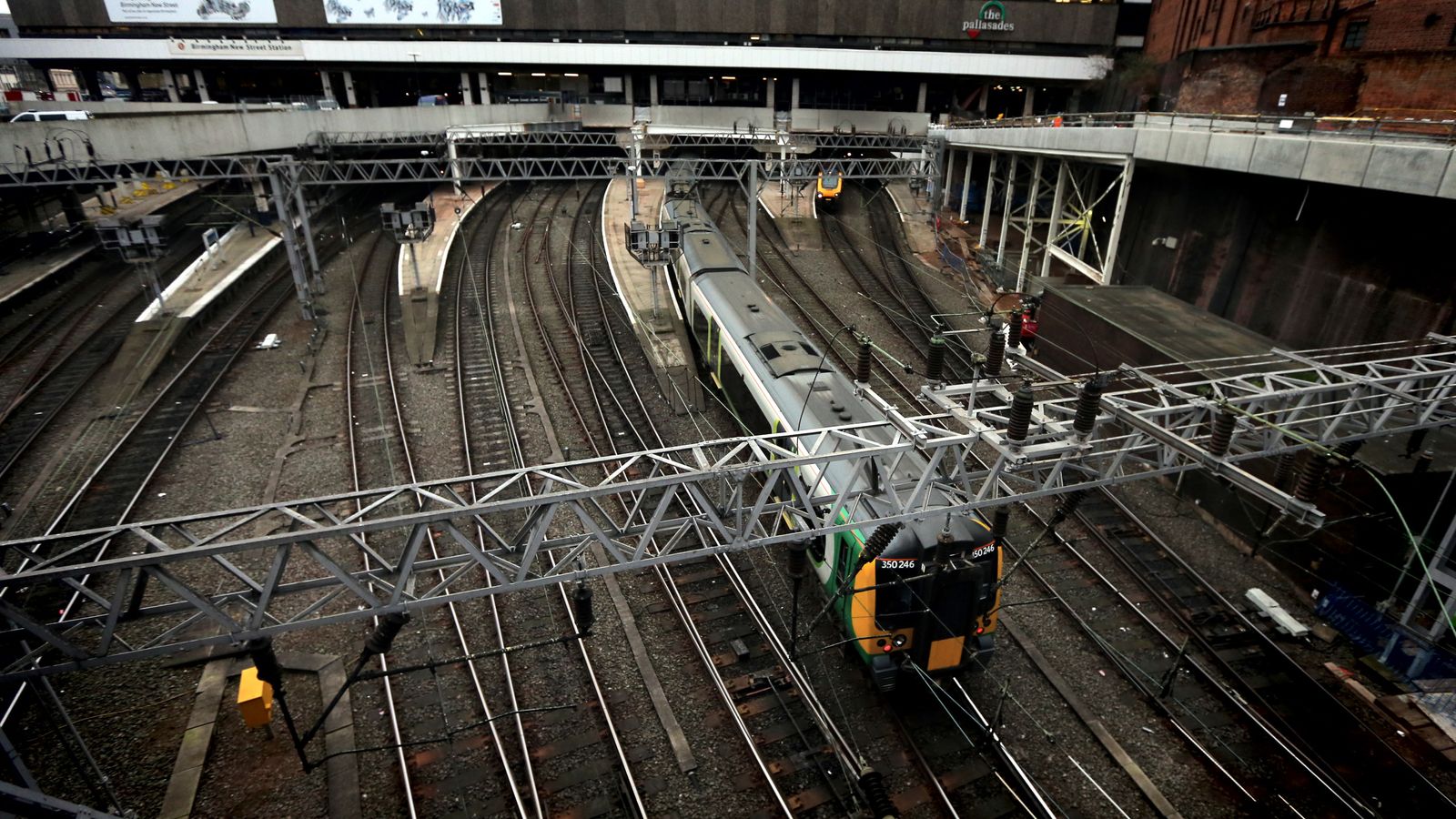Two of England’s mayors have outlined their proposals to revive rail in the Midlands and North post-HS2, insisting they “won’t accept a do-nothing scenario”.
Greater Manchester’s mayor, Andy Burnham, and his West Midlands counterpart, Andy Street, teamed up after the government axed the northern leg of the high speed rail project last year, and are trying to find an alternative to improve services between the cities with the help of the private sector.
Now the pair have offered up three options – from smaller upgrades through to a whole new line – they believe would provide “real benefits” to both their areas.
Politics live: Starmer meets with Brianna Ghey’s mother after Sunak’s ‘disgusting’ transgender jibe
Briefing journalists at an event in Birmingham, Mr Burnham said failing to increase capacity in the North West “would be damaging to economic growth in the regions and would mean the West Midlands and Greater Manchester would be set back”.
He also said it would leave the UK “with quite a serious transport headache for the rest of this century”, with both the West Coast Main Line and the M6 already “at capacity”.
The mayor added: “Having been promised Northern Powerhouse Rail with HS2 at its heart… we won’t accept a do-nothing scenario.”
Mr Street outlined the alternatives on the table following the work they carried out with a private sector consortium – including engineers, construction firms and finance experts, led by former HS2 boss Sir David Higgins.
Sky News Monday to Thursday at 7pm. Watch live on Sky channel 501, Freeview 233, Virgin 602, the Sky News website and app or YouTube.
The proposals are to either:
• Enhance the existing West Coast Main Line to “improve some of the most constrained parts” – though Mr Street warned it was the “minimal capital” option offering “minimum advantage”;
• Build major bypasses to the line at the southern end, as well as between Crewe and Stockport, alongside upgrades to the existing line;
• Construct a completely new and segregated line, but not built to the specification of the high-speed line in the south.
They could not commit to Sky News that there would be no need for public funding, but insisted it was “the less complicated part of the network” due to no need for tunnelling, and the transport benefits would be “huge”.
Mr Burnham also denied the ideas were “HS2 by the back door”, telling reporters they had “reluctantly” accepted the decision to scrap the second leg of the high speed project.
But Mr Street added: “We do believe there is a real benefit in one of those three or some blend between them,” added Mr Street.
Both mayors also praised the approach of Transport Secretary Mark Harper to their work, saying they held a “constructive” meeting with him last week and planned further talks in March.
The minister had previously suggested he was “open-minded” to any proposals, though he remained “somewhat sceptical” about whether HS2 could be completed without public investment.
Asked by Sky News about doubts in Westminster over their project, Mr Burnham said there were schemes “around the world” that had been largely privately funded, such as the expansion of the TGV in France, showing it can work.
“Those sceptical MPs really should look up some of what’s been done in other parts of the world where infrastructure have been delivered successfully in a less costly way than the original HS2 [line] and where the private sector has played a considerable role in taking the risk off the public sector,” he said.
“This is not unrealistic or pie in the sky. There are plenty of examples.”
Be the first to get Breaking News
Install the Sky News app for free
West Midlands mayor Andy Street also praised the approach of Mr Harper, telling Sky News: “It would have been very easy for the government to double down on the difficult decision they took at the Conservative Party conference.
“They have not done that.”
He adds: “The transport secretary has said it. He says he is ‘open-minded’ and described the meeting last week as ‘constructive’, so they are definitely willing to examine the outputs of this.”
But despite all the work with the private sector, would the final plan still need taxpayer cash?
“Not necessarily,” said Mr Burnham. “But that’s what [our] work will be looking at.”






















